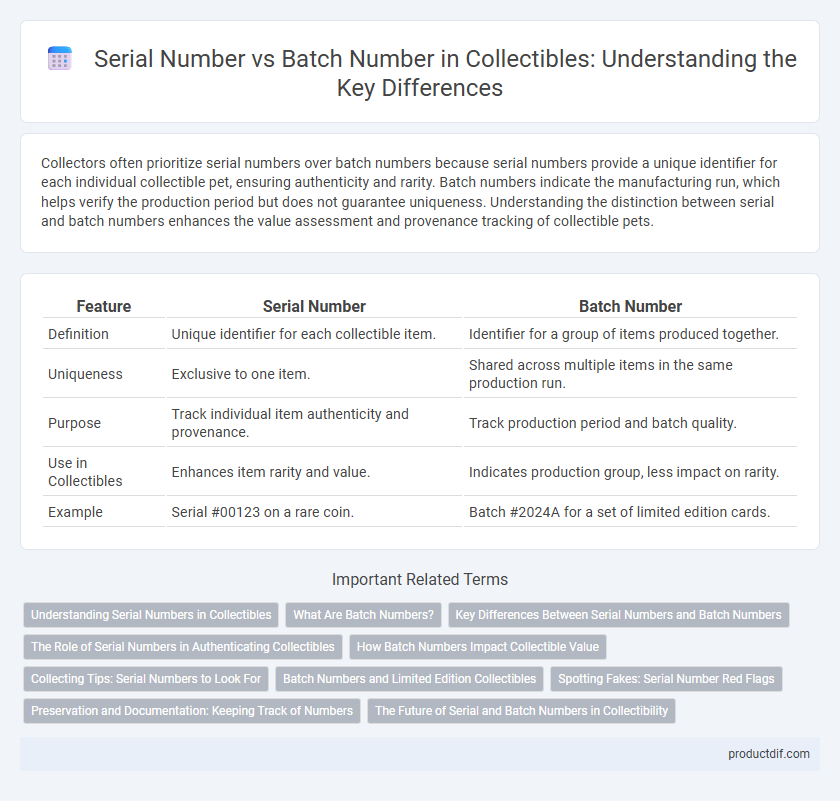Collectors often prioritize serial numbers over batch numbers because serial numbers provide a unique identifier for each individual collectible pet, ensuring authenticity and rarity. Batch numbers indicate the manufacturing run, which helps verify the production period but does not guarantee uniqueness. Understanding the distinction between serial and batch numbers enhances the value assessment and provenance tracking of collectible pets.
Table of Comparison
| Feature | Serial Number | Batch Number |
|---|---|---|
| Definition | Unique identifier for each collectible item. | Identifier for a group of items produced together. |
| Uniqueness | Exclusive to one item. | Shared across multiple items in the same production run. |
| Purpose | Track individual item authenticity and provenance. | Track production period and batch quality. |
| Use in Collectibles | Enhances item rarity and value. | Indicates production group, less impact on rarity. |
| Example | Serial #00123 on a rare coin. | Batch #2024A for a set of limited edition cards. |
Understanding Serial Numbers in Collectibles
Serial numbers in collectibles serve as unique identifiers that authenticate and distinguish individual items from others within the same batch, enhancing their rarity and value. Unlike batch numbers that group multiple items produced together, serial numbers provide a specific sequence that can track provenance and ownership history. This distinct numbering system plays a crucial role in verifying authenticity and maintaining the collectible's market integrity.
What Are Batch Numbers?
Batch numbers are unique identifiers assigned to a group of collectible items produced or packaged at the same time, allowing manufacturers and collectors to track production details and quality control. Unlike serial numbers, which are unique to each individual item, batch numbers represent the entire production run, helping to verify authenticity and pinpoint release periods. Collectors use batch numbers to assess rarity, manufacturing variations, and provenance within collectible markets.
Key Differences Between Serial Numbers and Batch Numbers
Serial numbers uniquely identify each individual collectible item, providing a specific reference that enhances authenticity and traceability. Batch numbers represent a group of collectibles produced at the same time, indicating production details but not individual uniqueness. Understanding these key differences helps collectors verify rarity and provenance more accurately.
The Role of Serial Numbers in Authenticating Collectibles
Serial numbers play a crucial role in authenticating collectibles by providing a unique identifier that distinguishes each item from others within the same series or batch. Unlike batch numbers, which indicate the production run or group, serial numbers enable precise tracking and verification of an individual collectible's provenance and authenticity. Collectors and experts rely on serial numbers to assess rarity, confirm legitimacy, and verify ownership history, thereby enhancing trust and value in the collectible market.
How Batch Numbers Impact Collectible Value
Batch numbers play a crucial role in determining a collectible's value by indicating the production run and rarity of the item. Collectibles from earlier or limited batches often command higher prices due to their scarcity and historical significance. Unlike serial numbers, which identify individual items, batch numbers provide context on manufacturing variations that influence collector demand and market worth.
Collecting Tips: Serial Numbers to Look For
Collectors should prioritize items with low or unique serial numbers, such as 001 or those matching significant dates, as these often hold higher value and rarity. Limited edition collectibles featuring serial numbers that correspond to production milestones or artist signatures can significantly increase desirability. Always verify authenticity and provenance linked to these serial numbers to ensure the collectible's legitimacy and potential appreciation.
Batch Numbers and Limited Edition Collectibles
Batch numbers are critical in identifying limited edition collectibles, as they indicate the specific production run within a series, helping establish authenticity and rarity. Collectors prioritize batch numbers to verify the collectible's exclusivity, which often directly influences its market value and desirability. Unlike serial numbers, which assign a unique identifier to each item, batch numbers group items produced together, making them essential for tracking editions and manufacturing details in limited releases.
Spotting Fakes: Serial Number Red Flags
Serial numbers on collectibles provide unique identification that batch numbers lack, making them crucial for verifying authenticity. Inconsistent fonts, missing digits, or repeated serial numbers can signal counterfeit items. Careful cross-referencing serial numbers with official databases helps collectors spot fake products and protect their investments.
Preservation and Documentation: Keeping Track of Numbers
Serial numbers provide unique identification for individual collectibles, ensuring precise documentation and facilitating detailed provenance records. Batch numbers group items produced together, aiding in preservation efforts by indicating shared manufacturing conditions and potential vulnerabilities. Accurate record-keeping of both serial and batch numbers enhances authentication processes and helps maintain the collectible's value over time.
The Future of Serial and Batch Numbers in Collectibility
Serial numbers are becoming increasingly crucial in establishing provenance and authenticity for collectibles, enabling precise tracking of individual items in limited editions. Batch numbers serve to identify production runs, illustrating variations and potential value differences among grouped collectibles. Emerging technologies like blockchain will further enhance the transparency and security of serial and batch number data, transforming their role in the future of collectibility.
serial number vs batch number Infographic

 productdif.com
productdif.com